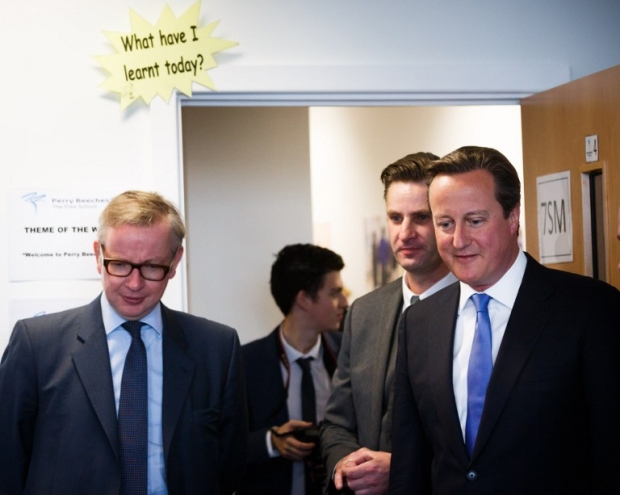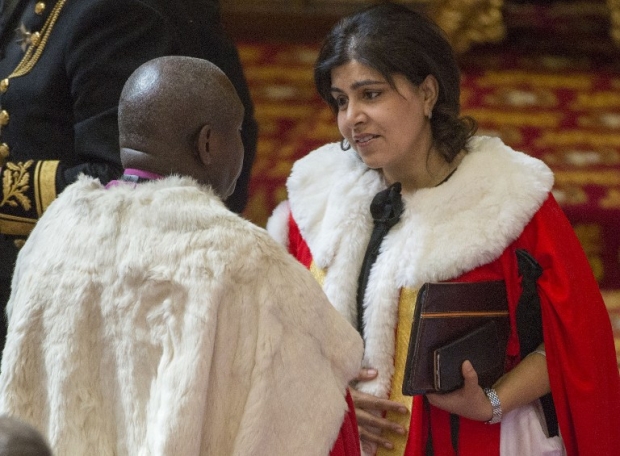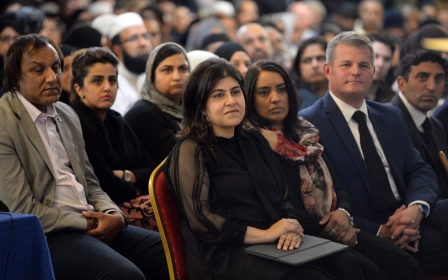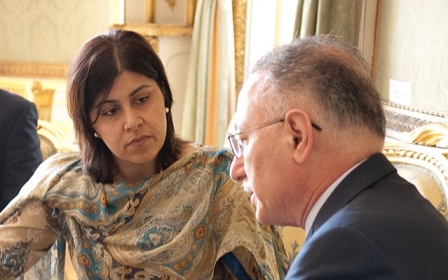Moral of Warsi: Tories can't cope with Muslims
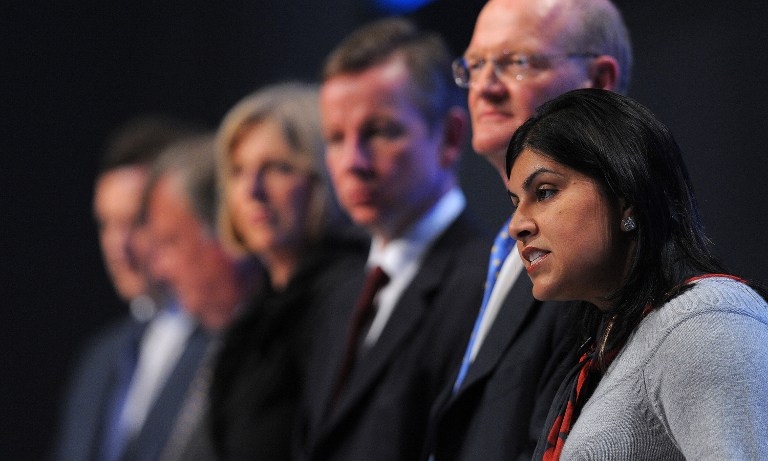
Any Muslim politician seeking to rise up the ranks of the Conservative Party has a choice. He or she can emulate Sajid Javid, one of five sons of a Pakistani bus driver who came to Britain in 1961 with one pound in his pocket.
It is worrying indeed that the modern Conservative Party no longer has room for Sayeeda Warsi
Though brought up a Muslim, Sajid Javid never campaigned on Muslim issues, or even noticed them. He is now a cabinet minister.
Or he or she could emulate Sayeeda Warsi, a taxi driver's daughter who resigned from the David Cameron government over British policy on the Gaza invasion in 2014.
Baroness Warsi has always celebrated her Muslim identity and Pakistani heritage. Her new book, The Enemy Within, shows that she has had to pay a price.
Throughout her political career, which is now finished, she has been subject to abuse on a scale few modern politicians have to cope with.
'The wrong signal'
The Tory Party took her in but refused to fully accept her. The influential ConservativeHome website published an article by Fox News commentator Niles Gardner which argued that her appointment sent "the wrong signal at a time when Britain is fighting a global war against Islamic terrorism".
Senior commentators, like Charles Moore and Tim Montgomerie, sneered at Warsi. She was never trusted. She tells how, when she was appointed Foreign Office minister, the Conservative Central Office tried to hire her special adviser to spy on her, reporting back on who she met and what she said.
Hers was the most distinguished resignation since Robin Cook over Iraq in 2003
Her character, actions and beliefs were repeatedly miscontructed, as I demonstrated last week when I exposed how reviewers such as Col Richard Kemp and Douglas Murray distorted and misrepresented what she had written in order to attack her.
Warsi eventually resigned at the height of the Israeli attack on Gaza in 2014. It was her job to defend British government policy in the House of Lords, and she found she could not support a government that refused to condemn Israeli military action. She has now left politics.
She says she might not have resigned if William Hague was still foreign secretary, and that she found Philip Hammond, foreign secretary at the time of Warsi's resignation (and whom she refers to as a "perfectly competent accountant") unsympathetic. Hers was the most distinguished resignation since Robin Cook over Iraq in 2003.
I think it is a terrible loss because Warsi devoted her 10-year career in frontline politics to arguing that you could be Conservative AND Muslim.
Her powerful Conservative opponents maintained that you could only be Conservative OR Muslim. They won. Hence the infamous 2016 London election campaign when Tory candidate Zac Goldsmith targeted Labour’s Sadiq Khan on the basis that the latter was Muslim, a strategy heavily criticised by Warsi.
Conservative lessons to learn
This book is a story of failure. It tells how the Conservative Party was unable to cope with Warsi's Muslim identity. I hope that the present leadership of the Conservative Party studies it closely because there are a lot of lessons to learn.
Warsi was born in Dewsbury in 1971, one of five daughters of a taxi driver who entered an arranged marriage in her late teens.
'My faith is about who I am and not about who you are. It’s a rule book for me, not a forced lecture series for you. Its strength is a source of peace for me not ammunition with which to fight you.'
- Sayeeda Warsi, from The Enemy Within
Warsi tells us very little about this period of her life, though she records that in her early 30s she had what she calls an "early mid-life crisis". Her marriage broke up, and she went to Pakistan in an attempt to work out her identity. She passes over very quickly what was obviously a hard period for her.
Returning to Britain, she got involved in Conservative Party politics, believing it stood for the values of her community - hard work, family, enterprise, initiative. She fought the Dewsbury by-election in 2005 but lost to Labour.
However, she fitted like a glove into the Tory Party that David Cameron tried to create after he became leader in the wake of the 2005 electoral defeat. She was a woman, Asian, a Muslim, northern and (by background) working class.
Cameron arranged her a seat in the House of Lords and shoved her onto the Tory front bench, and within a very short space of time promoted her to be Tory party chairman. This patronage-propelled rise up the ranks fuelled resentment - and reasonably so.
Captured by neocons
The most important section of this book tries to explain what went wrong thereafter. Part of the problem was that large parts of the Tory party refused to accept her. Some felt envious, and this was understandable.
Meanwhile, Cameron changed his position on Islam. Warsi accurately paints the picture of early Cameron as an outgoing, tolerant, inclusive leader at ease with multiculturalism.
Warsi found herself in a battle of ideas within the government about Muslim identity and the terrorist threat. Her side lost
Then he was captured by a clique of neoconservatives, of whom the most important was Michael Gove. The Policy Exchange think tank, which did so much to construct Conservative Party policy towards Islam in the years after 2005 (and at one stage was chaired by Gove), also played a huge role.
The most important part of this book deals with the development of the concept of non-violent extremism and the widening definition of terrorism. Gove and the Policy Exchange believed in the so-called "escalator" to terrorism. In other words, the more Islamic someone became, the more likely to kill.
There is, of course, another side to this story. I know senior Tories who insist Warsi was a trouble maker and not a team player. I have known her for many years, so perhaps I am biased, but I don't agree. I think she simply did not fit in with a party which, under Cameron, was trending to the right.
Exploding myths
By the standards of most politicians, Warsi is a normal person. She is not a fanatic. She doesn't want Islam to take over the world. She doesn't deny that there is a link between terrorism and Islam. She devotes an entire chapter to criticising the inwardness and backwardness of significant parts of British Islam, but rightly dismisses terrorist-sympathisers as a small and evil minority.
She accuses the Foreign Office of following the policy imperatives of certain countries, among them Saudi Arabia and Israel, ahead of Britain
She interprets Islam as the great compassionate religion that it is. She devotes a significant section of the book to taking her fellow religionists to task over their dreadful treatment of women in some Muslim countries.
Perfectly reasonably, however, she feels that we should allow British Muslims to play a full role in our national debate without making impossible demands that they should abandon what they believe.
She has some very tough things to say about British government policy. She accuses the Foreign Office of following the policy imperatives of certain foreign countries, among them Saudi Arabia and Israel, ahead of Britain.
She has a great deal to say about officially sponsored organisations that claim to speak on behalf of Islam. She defines the London-based Quilliam Foundation as "a bunch of men whose beards are tame, accents crisp, suits sharp, and who have a message the government wants to hear".
This is the best book ever written by a British Muslim politician, and I urge everybody who wants to understand modern Britain to read it. On page 232 she sets out eloquently what Islam means to her:
"My faith is about who I am and not about who you are. It's a rule book for me, not a forced lecture series for you. Its strength is a source of peace for me not ammunition with which to fight you. It's a ruler I have chosen to measure myself against, not a stick with which to beat you. It allows me to question myself, not to judge you. And recognising myself, being sure of who I am, being comfortable in my identity, does not mean having to downgrade, erase or reject who you are. I can only truly accept you for who you are if I am sure of who I am."
I fail to see how anyone can argue with that. It is worrying indeed that the modern Conservative Party no longer has room for Sayeeda Warsi.
- Peter Oborne was named freelancer of the year 2016 by the Online Media Awards for an article he wrote for Middle East Eye. He was British Press Awards Columnist of the Year 2013. He resigned as chief political columnist of the Daily Telegraph in 2015. His books include The Triumph of the Political Class, The Rise of Political Lying, and Why the West is Wrong About Nuclear Iran.
The views expressed in this article belong to the author and do not necessarily reflect the editorial policy of Middle East Eye.
Photo: Sayeeda Warsi (R), then shadow minister for community cohesion, speaks during the first day of the Conservative Party Conference in Manchester, north-west England, on 5 October 2009 (AFP)
New MEE newsletter: Jerusalem Dispatch
Sign up to get the latest insights and analysis on Israel-Palestine, alongside Turkey Unpacked and other MEE newsletters
Middle East Eye delivers independent and unrivalled coverage and analysis of the Middle East, North Africa and beyond. To learn more about republishing this content and the associated fees, please fill out this form. More about MEE can be found here.



